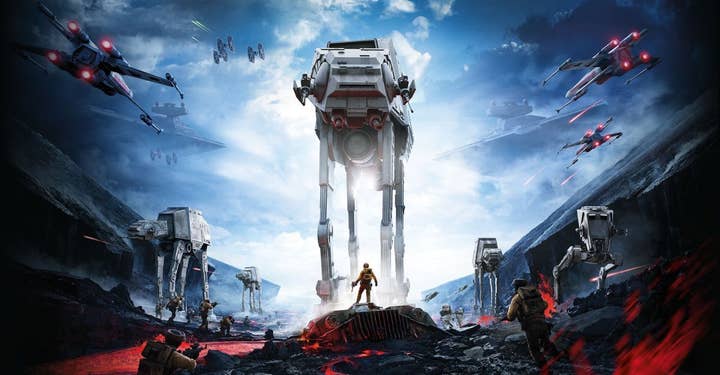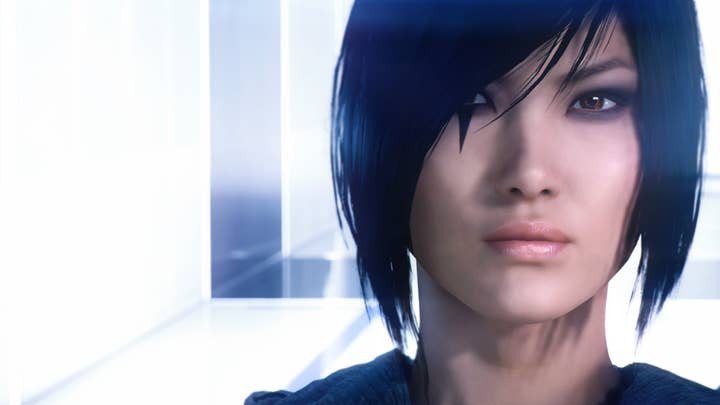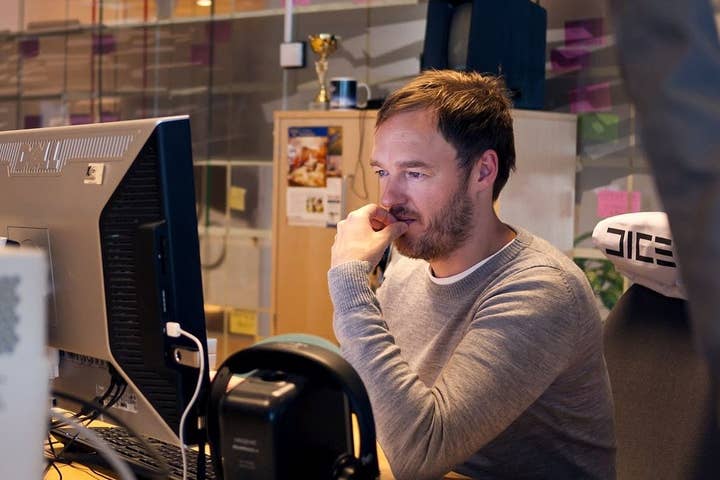Loading the DICE: GM Patrick Bach
Two very different IP, Star Wars Battlefront and Mirror's Edge, one studio. The GM explains how and why
You'd think Patrick Bach, general manager of Swedish EA studio DICE, would be sick of talking about Star Wars: Battlefront by now. Since it was announced that the Battlefield studio had picked up the IP, it's been the source of over-excited features, hot takes and plain old internet rants. But at E3 last month, away from the bustle of the show floor, Bach couldn't stop talking about the team's passion for the project. We spoke to him about that passion, Mirror's Edge Catalyst and DICE's growth as a development studio.
The immediate reaction when someone asks you to take on a Star Wars game, you kind of instantly think no. It's too much.
Because we were really fully booked, we're always fully booked on the things you're already doing and when someone comes around and says we have this thing called Star Wars and they really want to work with you… then of course your heart says yes. We have to figure this out.
So the process has been very interesting from that perspective, because this is really a project that is driven by passion and DICE as a studio has always had that as one of the pillars of DICE. If you're passionate about something it will turn out great. If you're not passionate it will be more like it's just work. And I think in what you've seen of Star Wars Battlefront so far it shines through, we are quite passionate. It's sometimes silly how passionate people are about this.
It's all about creating the Star Wars game we wanted to play but which didn't exist yet, it's good that there hasn't been a really great Star Wars game because it's an opportunity to make something that is truly our own and truly Star Wars. Working together really tightly with Lucasfilm on this has proven that they are as passionate as we are but we are experts in different fields. The overlap between DICE and Lucasfilm has been quite big when it comes to what we want to achieve.
It's somewhere in the middle. It's not respectful to not look at other games but it's also not respectful to try and copy things because you think oh this is what people want so let's do that because then you're back to the passion part - if you really know what you want to achieve then you should go for that. And you can take input from older games or whatever you take input from and be inspired by that and maybe even shortcut some decisions. 'You know what, they tried that and it didn't work.'
"The immediate reaction when someone asks you to take on a Star Wars game, you kind of instantly think no"
But most of the things we're doing are truly original because when it comes to the actual game design, DICE has been quite successful in the shooter genre. You could argue it would be easy for us to make a copy and paste version of something we already did and put a Star Wars skin on it, but then that wouldn't be true to what Star Wars is. If you look at a game like Battlefield, it comes from a very different inspiration source, it's a very different being - the emotion it evokes, what you're trying to achieve, is something very very different. Just putting Star Wars on top of that would not be the way to move forward. That was very clear to us from the very start, that this needed to be something of its own, something that at its core was different.
We've heard since we announced the game that people were worried about this and we have not heard a single word of that from people here playing the game. So that's been truly satisfying to finally let people see for themselves. To me it's clear that this is very passion driven project but then on a higher level it's a project that fits a studio like DICE.
I hadn't thought about that, it might sound naive to say we're not strategic in that way but I think we are, maybe for the first time, in a situation where we should plan for something bigger than we are? But that's also scary to me because one thing you don't want to do is remove the passion by planning too far ahead. Passion needs to come from where you are right now, where you want to be tomorrow, not in ten years. If you make plans like that and they change it will ruin your creativity.
We should probably just be open to the fact that things like that might happen and then we just roll with the punches, go wherever the wind blows.

It's a completely different pressure, to be honest. If you ever own IP it can be anything, it's up to you to shape it, define it and also iterate it and turn it into whatever you want it to be for the future. Here we have a franchise that's been around for quite some time to be honest and people have very fond memories of what it was and maybe not what it is. Your memories are one thing and then the reality is something else. A lot of people get disappointed when they watch the movies again, if enough time has passed, because what they remember was not even in the movies.
Then you have the other breed of Star Wars fan that watch the movies over and over and over and they are extremely current when it comes to what Star Wars is. At DICE we are probably the latter, because everyone has seen Star Wars quite a few times and then some extra times after we got the deal with Disney and Lucasfilm to do this. So I think the pressure it very different, you are attracting a very different audience with the Star Wars fan but also the same audience with the shooter fan.
Our job has been to create a shooter that springs out of the IP of Star Wars and not the IP of DICE, if you see what I mean? It's not supposed to be a DICE game, per se, it's supposed to be have the DICE qualities but it's a Star Wars game first and foremost. That's the bigger challenge, first of all to figure that out - what is the difference between this and that? - and then also explain to people that Star Wars is so big it could be anything. We chose to create this because we want to create this experience, and this is the emotion we want to evoke so this is what we're focusing on. And that pitch is really hard because Star Wars is so many things. If you try to do everything then everyone will be a little bit disappointed. Instead we are staying true to what we think is the right thing for this game.
"I don't have my meatballs with ice-cream because they're both good right?"
If you look at DICE as a studio we have a couple of pillars that we are always driving. We talked about passion, that's one of them, you need to passionate about what you're doing. You shouldn't base things only on data, you should vet it against data but you can't use it as the core of your passion. It's hard to be passionate about data right? [Laughs] Well, actually some people are.
So that's the same for any of our products, Mirror's Edge or Battlefield or Star Wars Battlefront. Also we strive for quality, that's always key to us. Quality in whatever you're trying to achieve, and quality can be many different things. We always try to push visuals and audio because whatever game you try to create it's about immersing you into that experience, you should demand that of a game.
It doesn't have to be one type of audio, the Star Wars audio is very different from the Battlefield audio, but the quality is very, very high. Also from a game design perspective it's about aligning all the game design around a couple of simple ideas - this game is about this therefore the design needs to be in that area. You don't cherry pick things and then put it in a pile, I don't have my meatballs with ice-cream because they're both good right? There's no vision, there's no idea in what you want to achieve if you just take stuff and blend it.
We're pretty good about finding the right core for what a game should be, the interesting thing is that even here at E3 we're showing Mirror's Edge, we're showing Star Wars Battlefront, they're both high quality games but they are extremely different. They taste very different and they have a very different feel and I think they will attract different audiences even if there's an overlap. To me that's a testament to what DICE stands for and how the learnings from one game… it doesn't show in our game but the result is there somewhere, you can see the effects that it has on the other game.
It's probably the alignment of many different things. First of all we've been thinking about Mirror's Edge ever since we released the last one, OK, what should the sequel be? It's been a process to actually get to a concept. The clean concept of Mirror's Edge Catalyst is the result of a lot of work because now you could argue it's very rudimentary and clean and simple and pretty because of that, but it's actually the result of a lot of hard work. And also the fact that we're pushing on the freedom of the city, you can free-roam and do almost whatever you want, the animation systems, we're moving it to Frostbite, we're doing so many things with it. I just don't think we could have made this game on the previous generation of consoles. There's an alignment in time of where this game is actually possible.

It's almost turned iconic in itself, not maybe the game but the fanbase has turned into this almost living, breathing thing. So yes and no, if we had only listened to the fans we would have been forced to make the game earlier. I think people almost gave up hope until we actually said 'you know what? Let's make it.' So I think we're probably a bit stubborn at DICE, we will not make a game that we don't think we can do justice to. I think our pitch internally to ourselves needed to be great so we could then pitch it to EA and say we'll spend a lot of man months and hours and talent on this and maybe not on something else. We believe in this, we will prove to you that this is amazing, and here we are, showing something today that is actually still quite different.
You could argue it's the same core concept as the first Mirror's Edge, which in a way is a bit sad and strange, it feels a bit obvious that the concept could have been done by someone else but maybe it takes a studio like DICE to do it? I don't know.
"DICE is actually competing with itself to make to make the best game"
I think the core is the same, there's a lot of passionate people that want to make amazing things. I think that's the core of any great studio. What has changed is that as you're building more and more games you get more confident in 'we know we can build this.' Write this thing on a piece of paper and we know we can create it. The confidence comes from we know what we can achieve, so that part we can relax a little bit in.
What we are not confident in is how do you push the bar? How do you take it further? Because I think that's one of the benefits with DICE and also one of the struggles that you always have, that you always want to push the bar. There's a lack of respect when you don't do it because the players want something that is better and I think it's our job as game developers and entertainers to actually do that. It's also in our DNA to want to push the bar in every way: storytelling, audio, visual, game design, controls, wherever it might make things better.
Back in the day, we were more or less a one and a half game studio, we were working on one game, releasing, starting the next one just before that. We were still struggling to reap the benefits of making several games, having several teams, we had overlapping teams more or less. Now we have three teams working in parallel on big projects and they're all working in the same engine with the same core technology and pollinating between the projects on tech and findings and learnings but still having a very sharp core on the game concept.
So DICE is actually competing with itself to make to make the best game. We are DICE, we make DICE games, how can we make them better?

